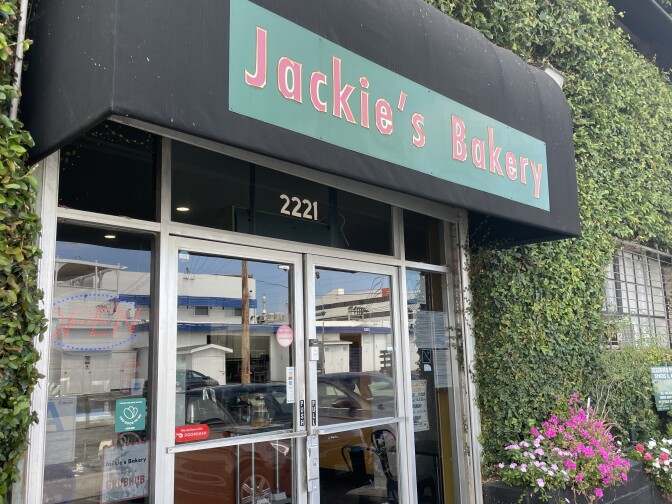This story is free to read because readers choose to support LAist. If you find value in independent local reporting, make a donation to power our newsroom today.
Want to fight climate change and food waste? One app can do both

More than a third of food grown in the U.S. goes uneaten, and that percentage has increased in the past five years. Much of that food ends up in landfills, where it decomposes, creating a potent gas that contributes to global warming.
A company based in Denmark has spent the past eight years working to bring that percentage down by helping restaurants sell food cheaply.
Too Good To Go works with businesses to sell their end-of-day leftovers for 60%-80% off. By matching hungry, cost-conscious customers with surplus food, the app's creators say they minimize waste, one bag of saved food at a time.
"I think it's doing that on a micro scale and having a macro impact," says Chris MacAulay, the app's U.S. country manager.
The app started in Denmark in 2015. Today there are participating stores in 17 countries and more than a dozen U.S. cities including New York, Phoenix and Seattle. Several cities including Santa Barbara, Minneapolis and Atlanta just started participating this year. The company claims Los Angeles is its most successful city yet. Next, it's headed to cities in the southeast.
MacAulay says the cheaper price tag and the recouped business costs are great side effects, but that's not the main point. "The kernel of the why is really around reducing food waste," he says. "Because it's such a large contributor to CO2e."
CO2e stands for the carbon dioxide equivalent of a product's total planet-warming gas emissions.
When someone buys a "surprise bag," the app adds that purchase to the consumer's lifetime climate impact tally. It displays all the electricity and the carbon emissions prevented from going to waste.

Rotten food in landfills makes a potent planet-warming gas called methane. The climate impact also includes the land and water used to grow that food and the gas used to power the trucks and factories that prepare and transport food.
According to the app's estimate, that translates to taking about 135,000 cars off the road for a year.
"That's a huge amount, especially considering that in the U.S. all food loss and waste accounts for about 6% of our total greenhouse gas emissions footprint," says Alexandria Coari with the food waste nonprofit ReFED, where she's the vice president of capital, innovation and engagement.
Coari says companies like Too Good To Go have the potential to reduce the equivalent carbon emissions of 870,000 cars in a year. "Marked-down alert apps like that of Too Good To Go are one of the top 10 solutions to fighting food loss and waste as well as climate change," she says.

These apps are especially popular among businesses that produce baked goods, since they can't sell stale food the next day. So there's no shortage of pastries, doughnuts, pizzas and bagels available.
"I think in the areas where they've tried to expand into retail grocery, even into manufacturing, there's still a little bit to be figured out there," Coari says.
Grocery stores increasingly have programs to divert food waste, by repurposing unsold produce into pre-made meals, providing in-store clearance sections and partnering with local food banks.
MacAulay says there is an especially high demand for bags from the grocery partners the app has.
"That's one of our responsibilities is to continue to broaden the selection on the app," says MacAulay. "We know that there are really popular surprise bags out there. And we want to make sure that people have a chance to get them."
Copyright 2025 KCRW
Loading...







